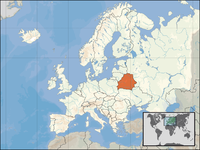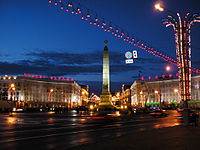Portal:Belarus
 |
|
The Republic of Belarus is a landlocked nation-state in Eastern Europe, which borders Latvia, Lithuania, Poland, Russia and Ukraine. Its capital city is Minsk, and other important cities include Brest, Hrodna (Grodno), Homel (Gomel'), Mahilyow (Mogilev) and Vitsebsk (Vitiebsk).
Throughout much of history, the area which is now known as Belarus was part of various countries including Grand Duchy of Lithuania, the Polish–Lithuanian Commonwealth and the Russian Empire. In 1918 the country declared independence as the Belarusian National Republic, since 1919 as the Bolsheviks took over Belarus it was known as the Byelorussian SSR. Eventually, in 1922, Belarus became a republic in the Soviet Union. The republic officially declared its sovereignty on 27 August 1990, and following the collapse of the Soviet Union, declared independence as the Republic of Belarus on 25 August 1991. Since 1994, amidst allegations of human rights violations and autocracy, Alexander Lukashenko has been the nation's president. As a consequence, Belarus has been excluded from joining the Council of Europe. The country also continues to suffer from the effects of nuclear fallout from the 1986 Chernobyl accident, which took place in neighboring Ukraine. Belarus is also in negotiations with neighboring Russia to integrate both of their economies, among other things, in a plan called the Union of Russia and Belarus.
Officially, the country is known as the Republic of Belarus (Belarusian: Рэспубліка Беларусь, Łacinka: Respublika Biełaruś; Russian: Республика Беларусь, Respublika Belarus), while the short name is Belarus (Беларусь, Biełaruś, Беларусь). The earlier name "Belorussia" (Белоруссия) can still be found in use, although mainly in historical contexts. Some consider the use of "Belorussian" derogatory, with its direct implication of Russification. The name has incorrectly been translated as "White Russia", a name that refers to a separate region.
Minsk (Belarusian: Мінск /mʲinsk/; Russian: Минск /mʲinsk/), is the capital and largest city of Belarus, situated on the Svislach and Nyamiha rivers. Minsk is also a headquarters of the Commonwealth of Independent States (CIS). As the national capital, Minsk has a special administrative status in Belarus and is also the administrative centre of Minsk voblast (province) and Minsk raion.
The earliest references to Minsk date to the 11th century (1067). In 1242, Minsk became a part of the Grand Duchy of Lithuania, and it received its town privileges in 1499. From 1569, it was a capital of the Minsk Voivodeship in the Polish–Lithuanian Commonwealth. It was annexed by Russia in 1793, as a consequence of the Second Partition of Poland. From 1919–1991, Minsk was the capital of the Byelorussian SSR.


Template:/box-header Marc Chagall, Elena Drobychevskaja Template:/box-footer
Template:/box-header Did you know...
- ...that Belarus Free Theatre is an underground theatre project created to oppose Belarusian government pressure and censorship?
- ...that the 17th century Biaroza monastery (pictured) in Biaroza, Belarus, has throughout its history been adapted into military barracks and a prison, and currently its ruins are an important baroque relic in the town?
- ...that the only remaining instance of active use of the death penalty in Europe is in capital punishment in Belarus?
- ...that, during the two-month Second Battle of Smolensk, the Red Army broke through the German defense setup, recaptured Smolensk, and started to liberate occupied Belarus?
- ...that Uładzimir Karatkievič was a Belarusian writer whose novels deal predominantly with Belarus's history, including the January Uprising?
- ...that only five people have been decorated Hero of Belarus, the highest title that can be bestowed on a citizen of Belarus?
- ...there are large stands of primeval forest on the border between Poland and Belarus?
 Europe Portal
Europe Portal Armenia
Armenia
 Latvia Portal
Latvia Portal Lithuania Portal
Lithuania Portal Poland Portal
Poland Portal 
 Russia Portal
Russia Portal 
 Ukraine Portal
Ukraine Portal 
 Soviet Portal
Soviet Portal
- Belarusian Republican Youth Union
- Constitution of Belarus
- Flag of Belarus
- Hero of Belarus
- My Belarusy
- National emblem of Belarus
- Category:Belarus
- Category:Belarus stubs
- Category:Belarusian culture
- Category:Belarusian law
- Category:Media in Belarus
- Category:Belarusian people
- Category:Belarusian society
- Category:Belarus-related lists
- Category:Populated places in Belarus
- Category:Communications in Belarus
- Category:Economy of Belarus
- Category:Education in Belarus
- Category:Environment of Belarus
- Category:Geography of Belarus
- Category:Government of Belarus
- Category:Health in Belarus
- Category:History of Belarus
- Category:Images of Belarus
- Category:Military of Belarus
- Category:Organizations based in Belarus
- Category:Politics of Belarus
- Category:Religion in Belarus
- Category:Science and technology in Belarus
- Category:Sport in Belarus
- Category:Tourism in Belarus
- Category:Transport in Belarus
Template:/box-header This page was created under the influence of Portal:Russia/New article announcements. It is created for everyone interested in Belarus-related articles to notice everything new.
URGENT ANNOUNCEMENT
- NONE
User:AlexNewArtBot/BelarusSearchResultTemplate:/box-footer


